 Intelligence and Counterintelligence
Intelligence and Counterintelligence
French Connection |  |
|
| SEE ALSO: Maj. Herve Gourmelon | |||
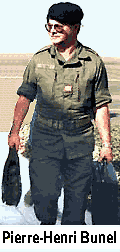

A French spy inside NATO A plot to steal Bosnia war plans By Richard J. Newman U.S.News & World Report magazine NATO leaders had already hinted broadly that their attacks would target Serbia's air defense network, command-and-control centers, and major military bases. Some officials even noted that the more that Milosevic knew about NATO's preparations, the more seriously he would have taken its threats. But the case of the alleged French spy inside NATO's headquarters in Brussels indicates the difficulty of achieving NATO unity in regions where history has forged strong bonds. The French, for instance, are viewed as generally sympathetic to the Serbs, since both fought against the Germans in World War II. Earlier this year, U.S. officials accused another Frenchman of informing Bosnian Serb strongman Radovan Karadzic of plans to apprehend him. And NATO officials suspect Greek nationals–who share Serbia's animosity toward Albanian Muslims–of also passing information to Milosevic. For someone who recently provoked world condemnation, the Serbian leader has a surprising number of friends.
The French uncover a security risk in NATO. It's probably not the only one. By Christopher Dickey and Rod Nordland, (Newsweek)
Today there are 16 member countries directly involved in NATO decision making, and they operate by consensus. Theoretically, at least, all of them have to know everything. So some of the "secret" documents Bunel is accused of giving to his Serb case officer were actually shared by as many as 200 NATO officials. Moreover, the members' regional interests are different--in the most extreme case, the mutual hostility between NATO members Greece and Turkey simmers just below the level of outright confrontation. The security situation gets more complicated still when you add 27 NATO partners with varying levels of information-sharing-- including Russia.

 France distances itself
France distances itselffrom NATO officer accused of aiding Serbs With PM-Yugoslavia-Kosovo POSTnet --- November 4 1998 05 43 25 AM Paris AP -- French officials today sought to distance themselves from a French officer accused of supplying sensitive information on planned NATO airstrikes. (full text) Serbs hailed as friends of French Army
They handed out leaflets demanding the release of Maj. Pierre Bunel, an
officer at NATO headquarters in Brussels who was jailed in France last month
and is under investigation for alleged espionage. Bunel is suspected of giving
Belgrade secret documents on threatened NATO airstrikes.
of Suspected Belgrade Spy Demonstrators call for solidarity with Serbia Paris, Nov. 1998 (Reuters, Central Europe Report)
French ministers have denied media reports that Bunel handed over detailed
attack plans, saying he did not have access to them. They also rejected
accusations that Paris still harbored a pro-Serbian bias, saying the Bunel
case was an isolated one unrelated to French policy in the Balkans.
France Sees NATO Ties Unhurt by Spy Case Washington Post By Charles Trueheart, Washington Post Foreign Service, Correspondent William Drozdiak in Berlin contributed to this report. Wednesday November 4 1998 Page A16 Paris Nov 3.
The officer, army Maj. Pierre Bunel, was working at NATO headquarters in Brussels as chief of staff to France's top military representative, Gen. Pierre Wiroth, when his behavior reportedly aroused the suspicions of France's military intelligence service.
World Digest Daily Southtown --- World Digest Wednesday November 4 1998 Spy case damages French bid for key Kosovo role The Times, London -- November 4 1998, From Charles Bremner in Brussels Investigators were seeking yesterday to determine how much of Nato's military planning was betrayed to Serbia by a French officer. France Says Spy Case Will Not Harm NATO Ties FOX News --- France Says Spy Case Will Not Harm NATO Ties 12 14 a m ET 515 GMT November 4 1998 Paris — The French government said Tuesday its often troubled ties to NATO would not be harmed by charges that a French army officer working in the alliance dailynews.yahoo.com American Broadcast Company News news.ninemsn.com.au FOX News Pro-Serb armyman held for spying Dawn Internet Edition --- 04 November 1998 Wednesday 14 Rajab 1419 Pro-Serb armyman held for spying Paris Nov 3 A French army officer was arrested for handing NATO secrets to Yugoslavia by members of France s own military intelligence service the Defence Protection. NEWS The Independent - UK --- Paris shamed by Nato spy arrest By John Lichfield in Paris Paris has been deeply embarrassed by the arrest of a pro-Serb French military officer who was allegedly passed Nato operational secrets to Belgrade The arrest of Commandant Pierre Bunel France faces new 'pro-Serbia' embarrassment in espionage affair The Nando Times Copyright © 1998 Nando Media Copyright © 1998 AFP Paris November 3 1998 2 50 p m EST http www nandotimes com - The arrest of a French spy for Serbia is only the latest though NATO spy damage said limited, but France stung CNN --- 3 November, 1998 Brussels Nov 3 Reuters 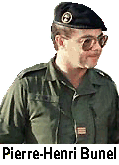 French officer accused of
French officer accused of telling Serbs of bomb targets The Dallas Morning News New York Times News Service, Paris , 3 November, 1998. 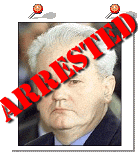
The officer, Maj. Pierre Bunel, 46, is suspected of having passed top-secret documents to Serbian agents, officials said. The documents related information about military targets that NATO forces would hit if President Slobodan Milosevic of Yugoslavia failed to meet a deadline of Oct. 27 to stop an offensive against civilians in Kosovo, the mainly ethnic Albanian province of Serbia. NATO officials in Brussels had no comment on the arrest. Maj. Bunel admitted passing documents to the Serbs but said he had acted out of sympathy for the Serbian cause, not for money, the officials said. | ||||
|
| SEE ALSO: Maj. Pierre-Henri Bunel |
|
"Time to go, boys!"
U.S. soldiers told the Serb commanders of a mechanized brigade in northern Bosnia, according to NATO spokesman Maj. Herve Gourmelon. 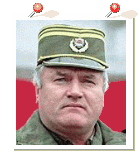

Monday, 19 February 1996 Bosnian Serb general a no-show at meeting © Nando.net / The Associated Press There have been reports that Karadzic passed checkpoints manned by NATO-led troops without difficulty. NATO had said it would not seek out war crimes suspects, but would detain them if they were seen. 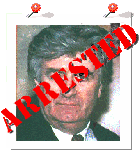
Gen. Zdravko Tolimir, deputy commander of the Bosnian Serb army, did not arrive at Sarajevo airport by the time the talks were to have started aboard the aircraft carrier USS George Washington.
| |
|
The Hunt For Karadzic
The inside story of the American and French plans to capture--or kill--Bosnia's leading war criminal. So where is he now, and why hasn't he been arrested?  By Thomas Sancton and Gilles Delafon, Paris
By Thomas Sancton and Gilles Delafon, Paris--With reporting by Mark Thompson /Washington Sancton and Delafon are co-authors of the forthcoming book Dear Jacques, Cher Bill: The Intimate History of a Presidential Relationship (Editions Plon) © Time Magazine August 10, 1998, vol. 152 no. 6 A senior French official who had recently returned from Bosnia had convinced Chirac that Mladic and Karadzic still controlled the situation on the ground and could derail the accords at any time. Clinton had heard this argument before. On Nov. 22, the day after the Dayton talks ended, the U.S. President had met with his advisers in the White House to assess the agreement. With his characteristic verve, Holbrooke had urged that Karadzic and Mladic be arrested and tried by the International Criminal Tribunal for the former Yugoslavia in the Hague. But the rules of engagement specified that peacekeepers could arrest suspects only if they "happened" upon them. It was an ambiguity that allowed Karadzic to drive unmolested through several NATO checkpoints after Dayton. Chirac argued forcefully that Mladic and Karadzic must be brought to justice. High-level French sources deny that the two Presidents explicitly discussed the idea of assassinating the two Bosnian Serbs, but they admit the possibility was seriously examined by French and American intelligence services. Indeed, according to a senior NATO military officer, undercover French troops literally had Mladic and Karadzic in their crosshairs on several occasions but did not fire because there was never an official green light. Clinton and Chirac agreed that night on the principle of a joint commando raid to capture the two suspects, and a secret Franco-American military committee was organized and assigned to plan the operation. The intelligence services of both countries set about tracking the movements, hideouts and habits of both men. Meanwhile, U.S. and French experts devised a plan to support local moderates and destabilize Karadzic politically. Holbrooke wanted to isolate Karadzic by jamming all his electronic communications. "But the CIA fought the idea tooth and nail and told me it was technically impossible," fumes Holbrooke. "And that's bull!" A former senior CIA official confirms that such a plan was discussed. The kidnapping scheme, in the meantime, ran into difficulties. For one thing, the services lost track of Mladic, who is believed to have left the country. The planning then focused on Karadzic. But there were repeated delays. "It's an extremely complicated job of intelligence gathering and military preparation," says a French official. "You need just the right opportunity to carry it out." By April 1997 a fully detailed plan complete with maps, diagrams and operational data had been drafted and printed in the form of a half-inch-thick booklet with an orange cover; code name: Operation Amber Star. It called for a two-pronged raid involving several hundred soldiers in which helicopter-borne French troops would "neutralize" the 30-man guard around Karadzic, while an elite U.S. commando force would move in and seize the suspect. Depending on the circumstances, those roles could be reversed. But such a hazardous operation could not proceed without head-of-state approval. On May 27, the 15 Atlantic Alliance leaders and Russian President Boris Yeltsin gathered in Paris to sign the nato-Russian treaty. After the speeches had been delivered and the documents signed, the distinguished guests retired to the garden of the Elysee Palace to chat over champagne and hors d'oeuvres. Chirac caught Clinton by the arm and pulled him off to the side for a private chat with German Chancellor Helmut Kohl and newly elected British Prime Minister Tony Blair. The subject of this impromptu mini-summit: the plan to kidnap Karadzic. But senior French and American officials also delivered a stern warning to Karadzic, saying in effect, "Either you give up voluntarily, or we are coming to get you. If we do, many people could be killed--including you." A French intelligence officer, Major Herve Gourmelon, long known for his pro-Serb sentiments, apparently got too chummy in his dealings with Karadzic's people and was yanked back to Paris last December. Press leaks out of Washington charged that Gourmelon had warned Karadzic of the kidnapping operation and had even given him the plans. The French admitted their officer had exceeded his authority but denied that he handed over, or ever possessed, the top-secret operational details. Furious over the episode, Chirac ordered an investigation, which concluded that there had been some "carelessness" but "no grave fault." The Gourmelon affair undermined, at least temporarily, Franco-American cooperation on the war-criminals issue. The plan to arrest Karadzic was put on hold in the late summer of 1997 by U.S. General Wesley Clark when he learned of the Gourmelon meetings. Last week the New York Times reported that Washington had finally scrapped all plans to nab Karadzic and Mladic because of U.S. military fears of a bloodbath, repeated French hesitations and the risk of Serb aggression. (full text) |
|
France denies foiling NATO plan to arrest Bosnian Serb war-crimes suspect Radovan Karadzic
By Charles Trueheart Washington Post Service Published Friday, April 24, 1998, in the Miami Herald
PARIS -- Faced with embarrassing disclosures about a French military officer's contacts in Bosnia with Bosnian Serb war-crimes suspect Radovan Karadzic, the French government Thursday denied ``categorically'' that the officer had compromised an allied plan to capture Karadzic. The French presidential palace and Foreign Ministry maintained near-silence on the case, first reported in Thursday's Washington Post, offering a terse Defense Ministry communique as the official response of the French government.
|
|
A Major Disturbance Mystery
over a French officer's role in Bosnia By Massimo Calabresi © TIME May 4, 1998 Vol. 151 No. 18
Everyone makes mistakes. Take French Army Maj. Herve Gourmelon. Back in 1994, while a press officer for UNPROFOR, the U.N. military mission in Bosnia, Gourmelon was caught on hidden video rifling through the desk of UNPROFOR's military commander, Gen. Michael Rose, according to sources in Sarajevo. "He was the most obvious spook in town," says one Bosnia-based Western diplomat. Thereafter marked as an active French agent among the international community, Gourmelon -- known for being an amiable, pipe-smoking guy who once accidentally discharged his pistol in the office and bought champagne to apologize -- was nonetheless tolerated by U.S. and European delegations. "It was known that he passed information to the Serbs [and] sometimes that was useful," the diplomat says, adding: "What has been alleged now does not fall into the 'useful' category."
|
